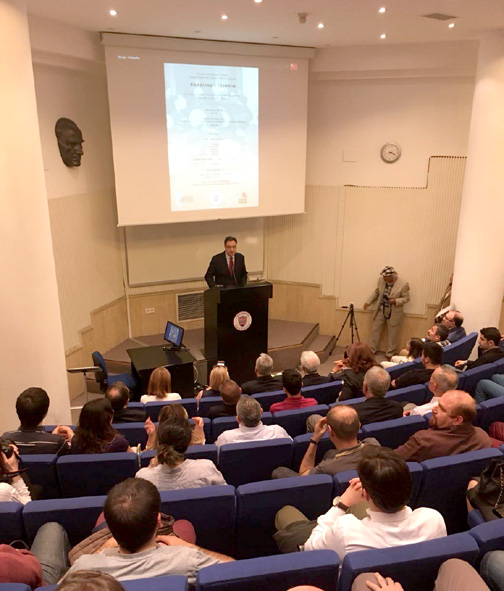
On April 19, the Department of History held a commemorative panel, “Abdürreşit İbrahim: A Turco-Tatar Traveler on the Roads of Kazan–Istanbul–Tokyo.”
In his welcoming remarks, Dr. Mehmet Kalpaklı, chair of the department, thanked the participants and sponsors of the event and introduced Abdürreşit İbrahim by referring to the poetry of Mehmet Akif Ersoy, who earnestly praised the renowned traveler and his remarkable endeavors over an immense geography during the final years of the Ottoman Empire.
Abdürreşit Münir İsker, a grandson of Abdürreşit İbrahim and the current general manager of Tepe Betopan, was next to address the audience; he spoke about
childhood memories of hearing his aunt’s first-hand accounts of his grandfather and his achievements.
The last of the opening remarks was delivered by the ambassador of Japan to Turkey, Akio Miyajima. Mr. Miyajima described his constant experience of the positive image of Japan in Turkey and credited Abdürreşit İbrahim as being an early contributor to forming this image in the early twentieth century.
The program continued with a panel by four academic researchers with expertise in related fields of history. Dr. Hakan Kırımlı of Bilkent University stated that it would be very difficult to confine the deeds of the man within narrow categories, observing that Abdürreşit İbrahim was, among many other things, a fascinating traveler who was never an ordinary tourist but rather a true participant in all aspects of life wherever he went. Dr. Kırımlı also noted that only a very small part of the vast literature he left behind has been examined so far.
The next speaker, Dr. İsmail Türkoğlu of Mimar Sinan Fine Arts University, discussed Abdürreşit İbrahim’s various endeavors, which often proceeded at great sacrifice to his personal life. Dr. Türkoğlu also commented on the unfair treatment he received from contemporaries and even close associates, who often ridiculed him and on occasion did not hesitate to betray him to state officials.
Dr. İbrahim Maraş of Ankara University related Abdürreşit İbrahim to seminal figures of the national awakening of the Tatars such as Ismail Bey Gaspıralı and Musa Carullah, contending that he could not be confined to the ideologies of Pan-Turkism and Pan-Islamism but rather was an anti-imperialist in the true sense.
The final speaker on the panel was Dr. Merthan Dündar, director of Ankara University’s Asia-Pacific Research Center, who also referred to the sheer scope of Abdürreşit İbrahim’s works and ambitious travels. In the course of his remarks, Dr. Dündar noted that additional commemorative programs pertaining to İbrahim’s life and work would take place in the various places visited by the man himself, continuing a series of events being held by the Asia-Pacific Research Center in different locations.
As the program came to a close, the attendees were invited to the opening reception of a related exhibition portraying the remarkable life of Abdürreşit İbrahim, which will remain open for viewing in the lower level foyer of FADA’s FF Building over the next few weeks.
By R. Murat Tiryaki – HIST
